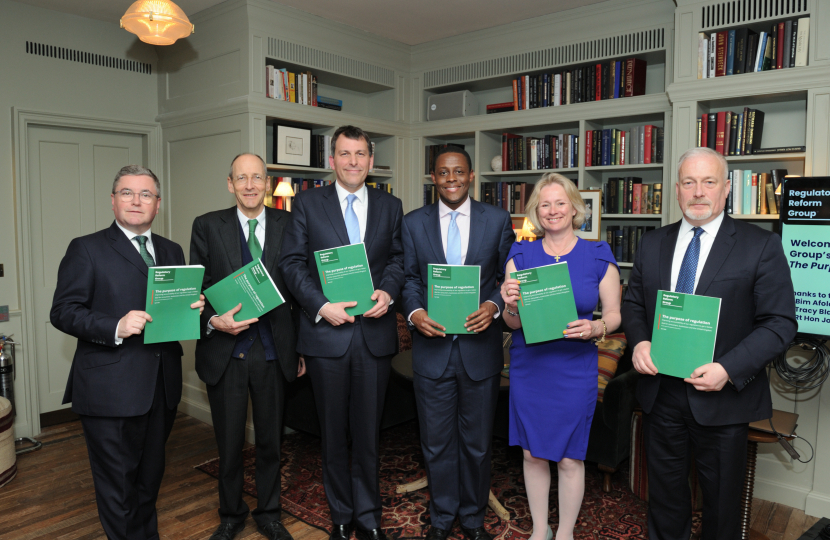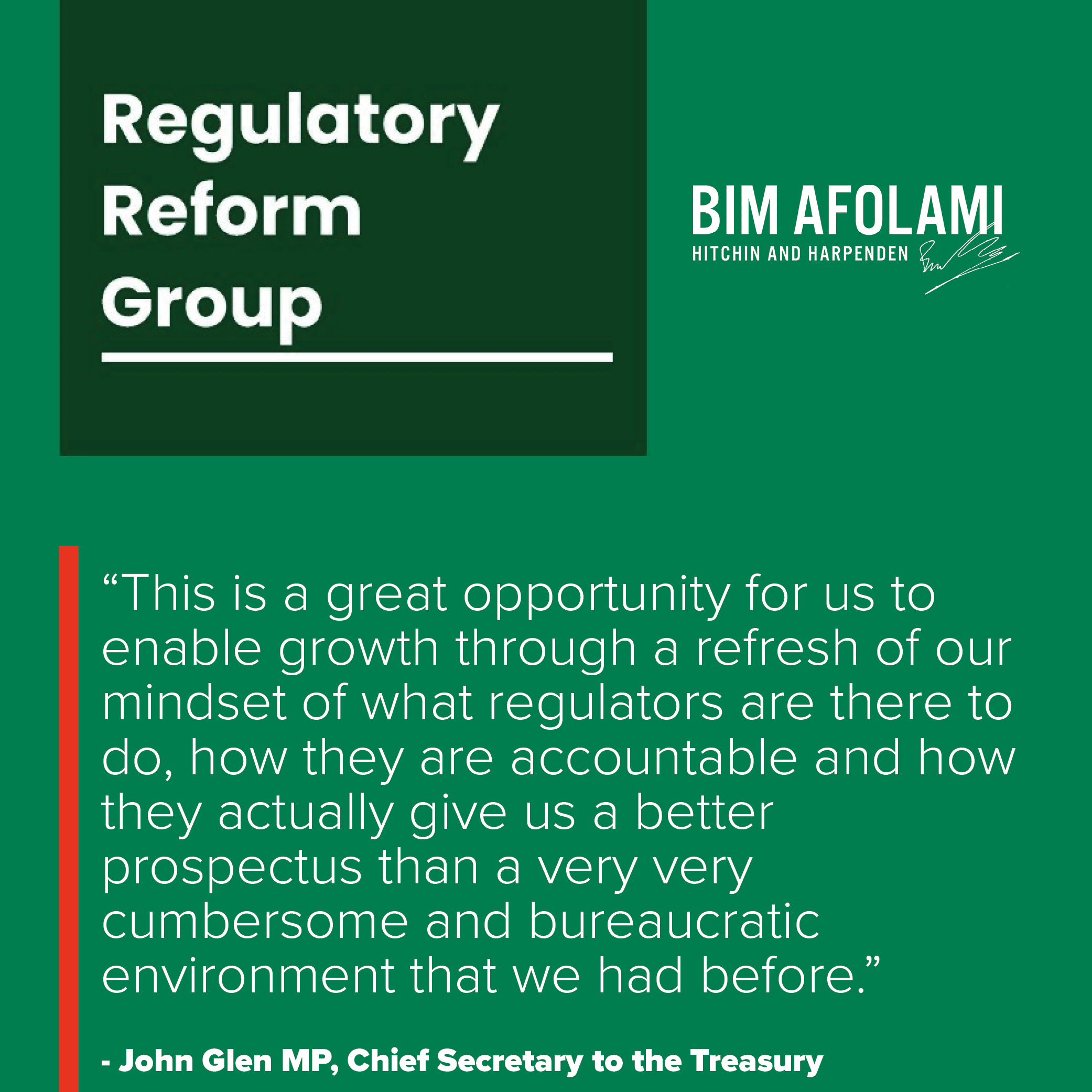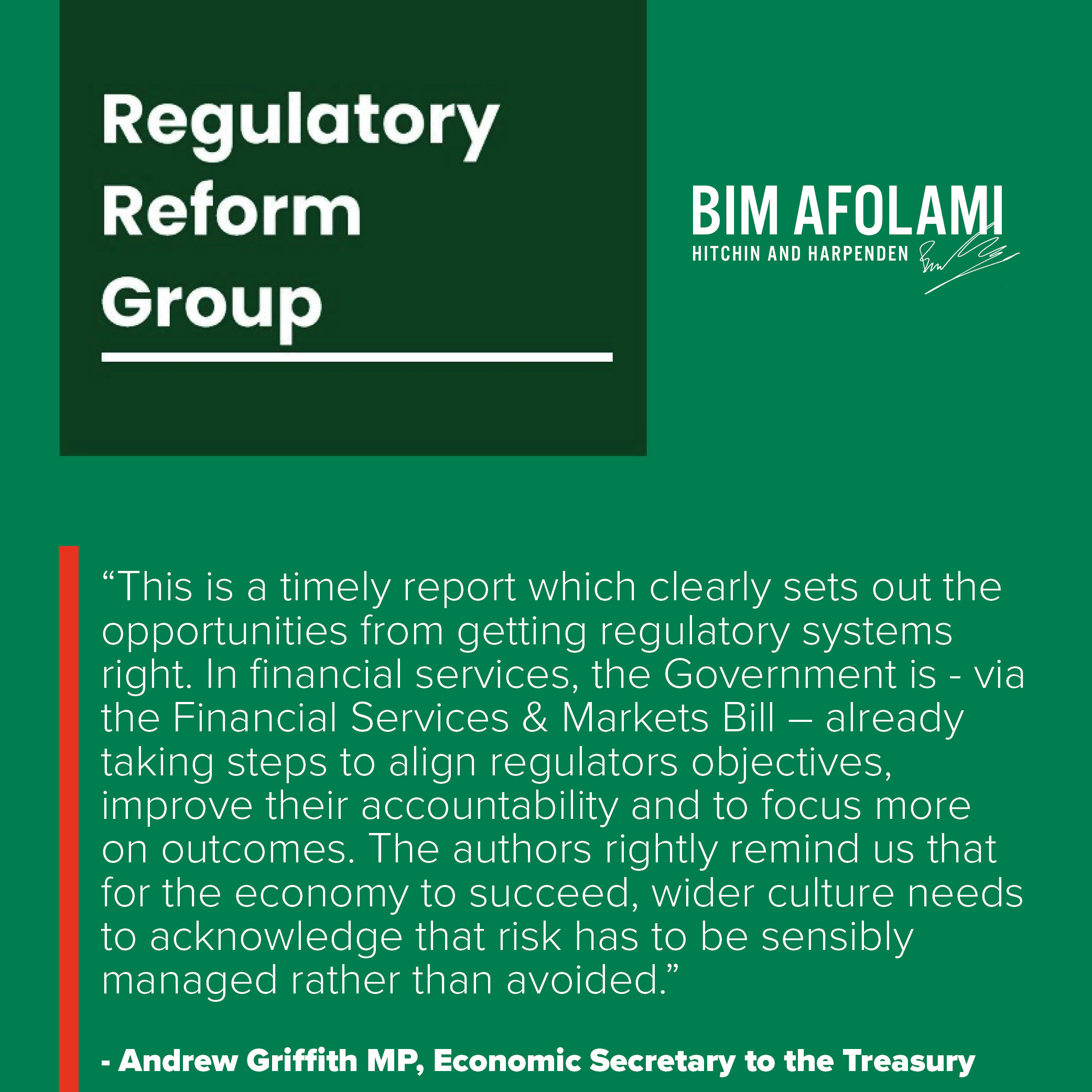
For the past several months I have been working with Parliamentary colleagues as Chair of the Regulatory Reform Group on a new report looking at the accountability of our regulators. On Tuesday I was delighted to launch that report alongside colleagues and Ministers.
Read on to find out more about the report or read the report in full online here: https://static1.squarespace.com/static/6363e5f35ce88928f09e6a5e/t/643d627fda5fab4b4d8772b8/1681744512465/RRG+Purpose+of+Regulation+140423.pdf.
Listen to my speech introducing the Report at the launch event
What were the key findings of the Report?
The report finds that our regulatory landscape is extremely strained. Specifically four areas were highlighted:
-
Strained regulatory relationships. The regulator-to-regulated relationship is not always collaborative and can be defined by mistrust, deterring innovation and leading to an excessively risk averse culture. This is in part driven by a culture of fear within regulators, encouraged by the media and parliamentary response to regulatory failure. The regulator-to-Government relationship can cause uncertainty for firms if there are disagreements around future policy. The regulator-to-regulator relationship can also cause uncertainty if policy development is made in isolation.
-
Incomplete lines of accountability. Regulators need to be accountable to new objectives and powers, as handed to the PRA and FCA in the Financial Services and Markets Bill, if they are to behave fundamentally differently. The performance of regulators is almost never measured by any objective criteria, making real accountability impossible. In some cases, regulators’ statutory objectives do not align to Government’s priorities, confusing the direction of travel for businesses.
-
A lack of strategic direction. Regulators can miss market developments in new areas because they do not fully understand them or are not incentivised to recognise them. It is also not clear how regulators are prepared - or are preparing - to address fast-moving and profound mega-trends such as an ageing population, climate change, or technological breakthroughs.
-
The need to build skills and knowledge. There are question marks over whether the skills and knowledge-mix is right within regulators. A high turnover of people can contribute to a lack of institutional memory. Attracting people to work in regulators is difficult when there are constraints on pay and workforce numbers, and where the focus is entirely institutional. This makes having a dynamic culture crucial to attracting talented people.
Hear from my interview at the launch, explaining why this report matters
What were the key recommendations from the report?
The report finds no single solution to fix our regulatory system. It makes six recommendations that seek to ‘start at the start’, focusing on creating a better system of accountability that will enable stronger scrutiny of regulatory issues:
-
Establish a clear definition of a regulator to enable better scrutiny. This would put an end to the current disjointed system. Government must provide absolute clarity with a published list of all bodies defined as regulators, their scope and remit, and the figures involved.
-
A Joint ‘Committee for Oversight of Regulators’. Made up of members from both Houses of Parliament, created to provide the capacity to scrutinise regulators in depth and measure their performance against their statutory objectives and consumer outcomes.
-
An ‘Office for Oversight of Regulators’ in the Cabinet Office. Tasked with improving regulatory performance on a day-to-day basis, interrogating strategic policy statements given to regulators, and ensuring that all parties understand the expectations, responsibilities and level of performance they are expected to achieve.
-
A new ‘Accountability Framework’ to measure regulators. To further enhance accountability of the regulators, a new ‘accountability framework’ would establish a standardised set of metrics to measure the performance of our major economic regulators.
-
An open, two-way, dialogue on regulatory implementation and performance. A formal mechanism to facilitate greater dialogue between regulators and Government, including their sponsoring Departments.
-
An ‘outcomes-based’ approach to future regulation. When regulating new sectors and emerging technology, we suggest that a regulatory ‘baseline’ be applied by the relevant industry regulator. Such a baseline would act as a guardrail, allowing further innovation, so long as this is not detrimental to the rights of consumers.
Read what Government Ministers are saying about the report


Check out some of the press coverage of the report
-
Tory MPs call for more scrutiny of ‘unchecked’ regulators - The Independent
-
London Market Group supports MPs' call for regulatory scrutiny - Insurance Insider
-
Zombie Brexit could tie Britain to EU rules permanently, Rishi Sunak is warned - iNews
-
We need to do something about bunged-up Britain - Financial Times
-
City must end era of ‘powerful and underperforming quangos’, MPs warn - Financial News
-
UK parliamentarians call for greater accountability of regulators - Investment and Pensions Europe
-
Parliamentarians on greater accountability of regulators - Actuarial Post
-
MPs call for greater democratic oversight of regulators - Pensions Age
-
Prominent Conservatives call for regulatory accountability - Accountancy Today
-
Parliament calls for greater regulatory accountability - Professional Pensions
-
Report: parliamentarians call for greater accountability of regulators - Pensions Expert
-
LMG backs Tory MPs’ calls for regulatory reform - Reinsurance News
-
UK regulatory approach to ILS deemed “not fit for purpose” - Artemis

